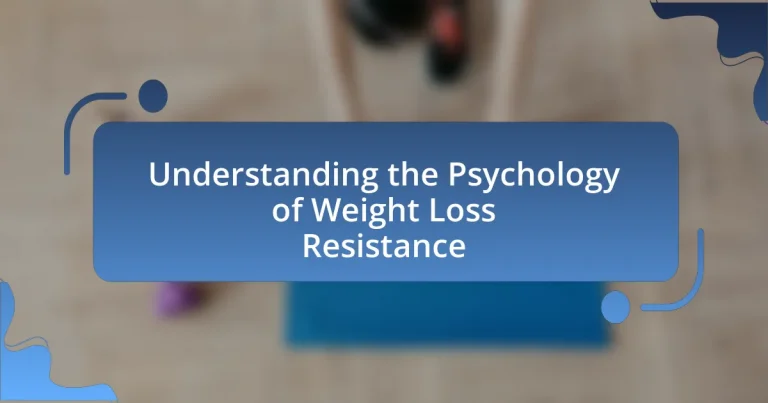The article focuses on the psychology of weight loss resistance, examining the mental and emotional factors that impede weight loss efforts despite individuals’ attempts. It highlights key psychological barriers such as emotional eating, low self-esteem, and lack of motivation, which contribute to a cycle of frustration and hinder progress. The article also discusses the impact of emotions, mindset, and self-perception on weight loss outcomes, as well as biological factors like hormonal imbalances and genetics. Strategies for overcoming weight loss resistance, including cognitive-behavioral techniques, mindfulness practices, and goal setting, are presented as essential components for achieving sustainable weight management.

What is the Psychology of Weight Loss Resistance?
The psychology of weight loss resistance refers to the mental and emotional factors that hinder an individual’s ability to lose weight despite efforts to do so. This phenomenon can be influenced by various psychological elements such as stress, emotional eating, and negative self-perception, which can create a cycle of frustration and defeat. Research indicates that psychological barriers, including a lack of motivation and self-efficacy, significantly impact weight loss outcomes. For instance, a study published in the journal “Obesity” by Van Strien (2018) highlights that emotional eating can lead to weight gain and resistance to weight loss, as individuals may turn to food for comfort during stressful times. Understanding these psychological components is crucial for developing effective weight loss strategies that address both the physical and mental aspects of weight management.
How does psychological resistance manifest in weight loss efforts?
Psychological resistance in weight loss efforts manifests through behaviors such as self-sabotage, procrastination, and emotional eating. Individuals may unconsciously resist change due to fear of failure or discomfort associated with new habits, leading to a cycle of inconsistent efforts. Research indicates that cognitive dissonance, where one’s beliefs conflict with their actions, can exacerbate this resistance, making it difficult to adhere to weight loss plans. For instance, a study published in the Journal of Obesity found that individuals who experience high levels of anxiety about weight loss are more likely to engage in binge eating, which undermines their goals.
What are the common psychological barriers to weight loss?
Common psychological barriers to weight loss include emotional eating, low self-esteem, and a lack of motivation. Emotional eating occurs when individuals consume food in response to feelings rather than hunger, often triggered by stress or anxiety. Low self-esteem can lead to negative body image, making it difficult for individuals to commit to weight loss efforts. A lack of motivation may stem from unrealistic expectations or previous failures, causing individuals to feel discouraged and abandon their goals. Research indicates that these psychological factors significantly impact weight loss success, as they can create a cycle of unhealthy behaviors and hinder progress.
How do emotions influence weight loss resistance?
Emotions significantly influence weight loss resistance by affecting behaviors related to eating and physical activity. Emotional states such as stress, anxiety, and depression can lead to overeating or unhealthy food choices, which hinder weight loss efforts. For instance, research published in the journal “Obesity” by Van Strien (2018) indicates that emotional eating is a common response to negative emotions, resulting in increased calorie intake and weight gain. Additionally, emotions can impact motivation levels; individuals experiencing low mood may lack the drive to engage in exercise, further contributing to weight loss resistance. Thus, the interplay between emotions and behaviors is crucial in understanding the challenges faced during weight loss.
Why is understanding psychology crucial for effective weight loss?
Understanding psychology is crucial for effective weight loss because it influences behaviors, motivations, and emotional responses related to eating and exercise. Psychological factors such as self-efficacy, motivation, and emotional triggers can significantly impact an individual’s ability to adhere to a weight loss plan. Research indicates that individuals who engage in cognitive-behavioral strategies, which address these psychological aspects, are more likely to achieve and maintain weight loss. For instance, a study published in the journal “Obesity” found that participants who received psychological support alongside dietary changes lost more weight than those who only followed a diet, highlighting the importance of addressing the mental and emotional components of weight management.
What role does mindset play in weight loss success?
Mindset plays a crucial role in weight loss success by influencing motivation, behavior, and resilience. A positive mindset fosters a belief in one’s ability to change, which is essential for adopting healthier habits and maintaining them over time. Research indicates that individuals with a growth mindset, who view challenges as opportunities for learning, are more likely to persist in their weight loss efforts. For instance, a study published in the journal “Health Psychology” found that participants who believed they could improve their self-control were more successful in achieving their weight loss goals compared to those with a fixed mindset. This demonstrates that mindset not only affects the approach to weight loss but also significantly impacts the outcomes.
How can self-perception affect weight loss outcomes?
Self-perception significantly affects weight loss outcomes by influencing motivation, behavior, and adherence to weight loss plans. Individuals who view themselves positively are more likely to engage in healthy behaviors, such as regular exercise and balanced eating, which are crucial for weight loss. Research indicates that self-efficacy, a component of self-perception, correlates with successful weight management; for instance, a study published in the journal “Obesity” found that higher self-efficacy is associated with greater weight loss success. Conversely, negative self-perception can lead to self-sabotage, decreased motivation, and ultimately hinder weight loss efforts.

What factors contribute to Weight Loss Resistance?
Weight loss resistance is primarily influenced by hormonal imbalances, metabolic adaptations, psychological factors, and lifestyle choices. Hormonal imbalances, such as elevated cortisol levels and insulin resistance, can hinder fat loss by promoting fat storage and increasing hunger. Metabolic adaptations occur when the body adjusts to a lower caloric intake, slowing down metabolism and making weight loss more difficult. Psychological factors, including stress, emotional eating, and negative body image, can lead to behaviors that sabotage weight loss efforts. Additionally, lifestyle choices such as inadequate sleep, sedentary behavior, and poor dietary habits further contribute to weight loss resistance by affecting energy balance and overall health.
How do biological factors influence weight loss resistance?
Biological factors significantly influence weight loss resistance by affecting metabolism, hormonal balance, and genetic predispositions. For instance, individuals with a slower metabolic rate may burn fewer calories at rest, making weight loss more challenging. Hormones such as leptin and ghrelin play crucial roles in appetite regulation and energy expenditure; imbalances can lead to increased hunger and decreased satiety, further complicating weight loss efforts. Additionally, genetic factors can predispose individuals to obesity by influencing fat storage and energy utilization, as evidenced by studies showing that certain genetic variants are associated with higher body mass index (BMI) and obesity risk. These biological components collectively create a complex environment that can hinder effective weight loss.
What is the impact of genetics on weight loss resistance?
Genetics significantly impacts weight loss resistance by influencing metabolic rates, fat distribution, and appetite regulation. Research indicates that genetic variations can affect how individuals respond to diet and exercise, leading to differences in weight loss success. For instance, studies have identified specific genes, such as FTO and MC4R, that are associated with obesity and can predispose individuals to weight loss resistance. These genetic factors can alter hormonal responses and energy expenditure, making it more challenging for some people to lose weight despite similar lifestyle changes compared to others.
How do hormonal changes affect weight loss efforts?
Hormonal changes significantly impact weight loss efforts by influencing metabolism, appetite, and fat storage. For instance, fluctuations in hormones such as insulin, cortisol, and leptin can lead to increased hunger and cravings, making it more challenging to adhere to a calorie deficit. Research indicates that elevated cortisol levels, often associated with stress, can promote fat accumulation, particularly in the abdominal area, which complicates weight loss. Additionally, insulin resistance, a condition where the body’s cells become less responsive to insulin, can hinder the ability to burn fat effectively. Studies have shown that hormonal imbalances can create a cycle of weight gain and difficulty losing weight, underscoring the importance of hormonal regulation in successful weight management.
What psychological factors are linked to weight loss resistance?
Psychological factors linked to weight loss resistance include stress, emotional eating, and negative body image. Stress can lead to hormonal changes that promote fat storage, while emotional eating often results from using food as a coping mechanism for negative emotions. Additionally, a negative body image can decrease motivation and self-efficacy, making it harder for individuals to adhere to weight loss plans. Research indicates that individuals with high levels of stress and poor body image are less likely to achieve their weight loss goals, as evidenced by studies showing that psychological well-being significantly impacts weight management outcomes.
How do past dieting experiences shape current behaviors?
Past dieting experiences significantly influence current behaviors by establishing patterns of eating, emotional responses, and self-perception. Individuals who have undergone restrictive diets may develop a heightened sensitivity to food cues, leading to cravings and binge eating when faced with similar situations. Research indicates that repeated cycles of dieting can create a psychological association between food and restriction, which may result in a counterproductive relationship with food, often referred to as “dieting backlash.” A study published in the journal “Obesity” by Polivy and Herman (2002) found that individuals who frequently dieted were more likely to experience weight regain and disordered eating behaviors, demonstrating how past dieting can perpetuate a cycle of weight loss resistance.
What is the role of stress and anxiety in weight management?
Stress and anxiety significantly impact weight management by influencing eating behaviors and metabolic processes. Elevated stress levels trigger the release of cortisol, a hormone that can lead to increased appetite and cravings for high-calorie foods, contributing to weight gain. Research indicates that individuals experiencing chronic stress are more likely to engage in emotional eating, which further complicates weight management efforts. A study published in the journal “Obesity” found that stress-induced eating can lead to a 20% increase in caloric intake, highlighting the direct correlation between stress and weight gain. Additionally, anxiety can disrupt sleep patterns, which is linked to weight gain due to hormonal imbalances that affect hunger and satiety. Thus, managing stress and anxiety is crucial for effective weight management.

How can individuals overcome Weight Loss Resistance?
Individuals can overcome weight loss resistance by implementing a multifaceted approach that includes dietary adjustments, regular physical activity, and psychological strategies. Research indicates that a balanced diet rich in whole foods, such as fruits, vegetables, lean proteins, and healthy fats, can enhance metabolic function and promote weight loss. Additionally, incorporating strength training and cardiovascular exercises at least 150 minutes per week can improve insulin sensitivity and increase calorie expenditure.
Psychologically, addressing emotional eating through mindfulness practices and cognitive behavioral therapy can help individuals identify triggers and develop healthier coping mechanisms. A study published in the journal “Obesity” by Van Strien (2018) highlights that individuals who engage in mindful eating are more successful in managing their weight. By combining these strategies, individuals can effectively combat weight loss resistance and achieve sustainable results.
What strategies can help address psychological barriers?
Cognitive-behavioral therapy (CBT) is an effective strategy to address psychological barriers related to weight loss resistance. CBT helps individuals identify and change negative thought patterns and behaviors that contribute to their struggles with weight management. Research indicates that CBT can lead to significant weight loss and improved psychological well-being, as evidenced by a meta-analysis published in the journal Obesity, which found that participants who underwent CBT lost an average of 5-10% of their body weight over six months. Additionally, mindfulness practices, such as meditation and mindful eating, can reduce stress and enhance self-awareness, further aiding in overcoming psychological obstacles. Studies show that mindfulness-based interventions can lead to healthier eating habits and weight loss, supporting the effectiveness of these strategies in addressing psychological barriers.
How can cognitive-behavioral techniques aid in weight loss?
Cognitive-behavioral techniques aid in weight loss by helping individuals identify and change negative thought patterns and behaviors related to eating and exercise. These techniques, such as self-monitoring, goal setting, and cognitive restructuring, enable individuals to develop healthier habits and improve their motivation. Research indicates that cognitive-behavioral therapy (CBT) can lead to significant weight loss; for instance, a study published in the journal “Obesity” found that participants who underwent CBT lost an average of 5-10% of their body weight over six months. This evidence supports the effectiveness of cognitive-behavioral techniques in facilitating sustainable weight loss by addressing the psychological factors that contribute to weight gain and resistance.
What role does goal setting play in overcoming resistance?
Goal setting plays a crucial role in overcoming resistance by providing clear direction and motivation. When individuals establish specific, measurable, achievable, relevant, and time-bound (SMART) goals, they create a structured framework that helps them focus their efforts and track progress. Research indicates that setting goals enhances commitment and accountability, which are essential for maintaining motivation in the face of challenges. For instance, a study published in the Journal of Consulting and Clinical Psychology found that participants who set specific weight loss goals lost more weight than those who did not, demonstrating the effectiveness of goal setting in overcoming psychological barriers to weight loss.
What practical tips can support sustainable weight loss?
To support sustainable weight loss, individuals should focus on creating a calorie deficit through balanced nutrition and regular physical activity. Research indicates that a combination of a healthy diet, such as incorporating whole foods and reducing processed foods, along with consistent exercise, can lead to long-term weight management. A study published in the journal “Obesity” by Thomas A. Wadden and colleagues found that participants who engaged in both dietary changes and physical activity lost more weight and maintained it better than those who relied on diet alone. Additionally, setting realistic goals, tracking progress, and seeking social support can enhance motivation and adherence to weight loss efforts, further reinforcing sustainable habits.
How can mindfulness practices enhance weight loss efforts?
Mindfulness practices enhance weight loss efforts by promoting greater awareness of eating habits and emotional triggers. This increased awareness allows individuals to recognize and modify unhealthy eating patterns, leading to more intentional food choices. Research indicates that mindfulness can reduce binge eating and emotional eating, which are significant barriers to weight loss. A study published in the journal “Obesity” found that participants who engaged in mindfulness training experienced a greater reduction in body mass index compared to those who did not practice mindfulness. This evidence supports the effectiveness of mindfulness in fostering healthier relationships with food and improving weight management outcomes.
What are effective ways to build a supportive environment for weight loss?
Effective ways to build a supportive environment for weight loss include fostering social support, creating a healthy home environment, and promoting accountability. Social support from friends and family can significantly enhance motivation and adherence to weight loss goals, as studies show that individuals with supportive social networks are more likely to succeed in their weight loss efforts. A healthy home environment, which includes having nutritious foods readily available and minimizing the presence of unhealthy options, encourages better dietary choices. Additionally, promoting accountability through group activities, such as weight loss challenges or support groups, can help individuals stay committed to their goals. Research indicates that environments that encourage healthy behaviors lead to more successful weight management outcomes.
What are common misconceptions about weight loss resistance?
Common misconceptions about weight loss resistance include the belief that it is solely due to a lack of willpower or discipline. Many individuals assume that if they simply eat less and exercise more, they will lose weight, ignoring the complex interplay of hormonal, metabolic, and psychological factors that contribute to weight loss resistance. Research indicates that factors such as insulin resistance, thyroid dysfunction, and stress-related hormonal imbalances can significantly hinder weight loss efforts, demonstrating that weight loss resistance is not merely a matter of personal choice or effort. Additionally, some people mistakenly think that weight loss resistance only affects those who are overweight, while studies show that individuals of all body types can experience this phenomenon, further complicating the understanding of weight management.
How can understanding these misconceptions improve weight loss strategies?
Understanding misconceptions about weight loss can significantly enhance weight loss strategies by allowing individuals to adopt more effective and realistic approaches. For instance, many people believe that extreme calorie restriction is the best way to lose weight, but research indicates that sustainable weight loss is more effectively achieved through balanced nutrition and regular physical activity. A study published in the journal “Obesity” by Thomas et al. (2014) found that participants who focused on healthy eating patterns rather than severe calorie deficits experienced better long-term weight management. By addressing these misconceptions, individuals can develop strategies that promote healthier behaviors, reduce frustration, and improve adherence to weight loss plans.
What are the best practices for maintaining motivation during weight loss?
To maintain motivation during weight loss, individuals should set realistic goals, track progress, and seek social support. Setting achievable, specific goals helps create a clear path and reduces feelings of overwhelm, which is supported by research indicating that goal-setting enhances motivation (Locke & Latham, 2002). Tracking progress, whether through journaling or using apps, provides tangible evidence of success, reinforcing commitment. Additionally, social support from friends, family, or support groups has been shown to improve adherence to weight loss plans, as social connections can enhance accountability and encouragement (Wing & Jeffery, 1999).


